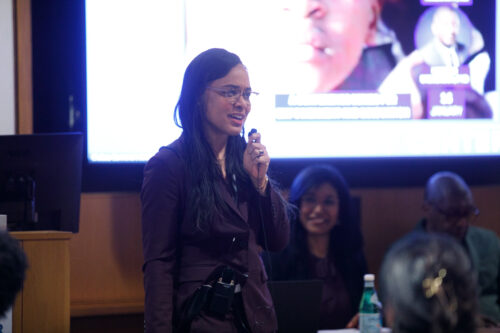Image courtesy of Amanda Calhoun.
In October 2021, experts in youth mental health declared the mental health crisis among children and young adults a national emergency. At the time, Amanda Calhoun ’11, now Chief Resident of the Yale Albert J. Solnit Integrated Adult/Child Psychiatry program, was focused on studying the status of mental health outcomes for one group in particular: Black youth. Recent studies have revealed that Black youth face rising suicide rates. Calhoun noted that previous psychiatric research has also focused on how external factors like poverty, stigma towards mental health, and lack of education inhibit Black youth’s ability to access mental health care. However, Calhoun’s concerns went in a different direction. “As a psychiatry fellow, I couldn’t stop thinking about the medical racism Black youth and families face when they do access care,” Calhoun said. With this critical observation, Calhoun established the Black Youth Mental Health Clinical Case Conference Series at Yale.
The case conference series, which began in January and concludes in June, seeks to interrogate real cases of anti-Black medical racism. At the center of every event lies a desire to humanize Black youth. One way Calhoun achieves this is through storytelling. “I wanted everyone to be able to relate to the struggle this child was having no matter what their background is,” Calhoun said. “I want people to feel like these children are in the room with us.” At the first case conference, Calhoun shared the compelling story of Christina, a young Black girl who was admitted to the hospital due to “out of control” behavior. During her stay, Christina’s already precarious situation was exacerbated by incidents of racism from her predominantly white medical team.
Importantly, narratives like Christina’s illuminate how medical racism manifests itself. When white medical providers comment that Christina’s hair is “wild” or refer to her as the “Tasmanian devil,” they invoke a history of anti-Black medical racism. By sharing narratives like Christina’s, the case conference series emphasizes an important point: her story is not unique.
Anti-Black racism is deeply embedded in the American medical system, and without a concerted effort, Black youth seeking mental health care will continue to be victimized. Notably, the cases discussed in the conference series are anonymized to ensure medical providers do not face retaliation. Calhoun herself is no stranger to the backlash that can arise from speaking out against medical racism. In 2021, after giving the keynote speech at the White Coats for Black Lives demonstration at the Yale School of Medicine, Calhoun was the target of multiple death
threats. “The death threats were not the most difficult part of being an activist. […] What’s more difficult is getting people to stand up against racism,” Calhoun said. This encapsulates the ethos of the case conference series: to not only raise awareness but also to find solutions to medical racism.
Another integral feature of the case conference series is the commentary of three expert discussants. Though the conference delves into issues of mental health, not all of the expert discussants are required to have a background in psychiatry. “We try to pull from diverse backgrounds,” Calhoun explained. “Most children will never see a child psychiatrist, […] but they will see their teacher, maybe their counselor, maybe their religious leader.” By inviting experts who hail from a variety of disciplines, the conference takes an interdisciplinary approach, harnessing diverse perspectives to tackle a complex issue. The conference is also designed to reflect this same diversity of thought in the audience; it is free to register, open to the public, and has a hybrid format to encourage attendance.
In the future, Calhoun hopes the conference will be even more widely attended and lead to tangible initiatives and solutions. She also plans to consolidate all of the insights and discussions from the case conference series into a book that can be used as a reference for healthcare professionals. “It feels gratifying to take these stories and write [them] on paper. It feels like giving voice to the voiceless and giving space to stories that have been silenced,” Calhoun said. “There’s a lot of racist behavior in the medical system, and it needs to change, and one of the ways to do that is to start calling it out.”

